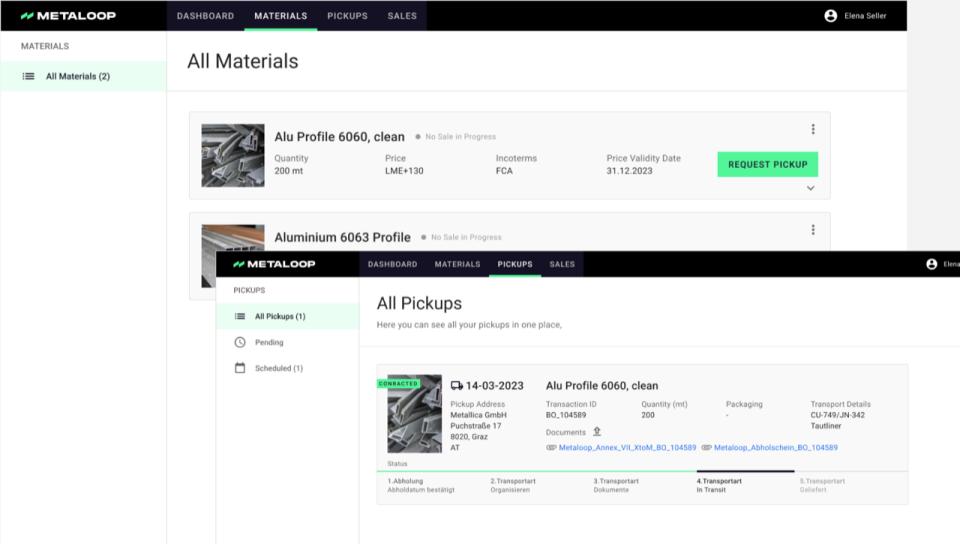Material wealth: Scrap metal trading marketplace Metaloop raises $17M
European Union (EU) lawmakers this month announced plans to reduce waste and increase recycling across the bloc, with proposals to collect and process 45% of 16 identified "strategic" raw materials by 2030. These include metals such as copper, which is used in everything from computers and TVs, to domestic wiring and electric generators.
At the same time, numerous startups have been raising sizable VC dollars for technologies that help people and industries reuse and recycle materials such as plastic; batteries; carbon fiber; carpet; and, indeed, metal.
One such startup is Metaloop, a seven-year-old Austrian company that connects scrap metal sellers with buyers, which today announced it has raised €16 million ($17 million) in a Series A round of funding.
Now by "sellers," this doesn't mean individuals or businesses that collect scrap metal for the express purpose of selling it -- in all likelihood, they already have the requisite knowledge and networks to offload their material gains. No, in Metaloop's world, a seller will most likely be an industrial entity where scrap metal is a by-product of something else they create -- and where they don't have the expertise to monetize their offcuts. This could be industrial manufacturers ranging from small localized SMBs to billion-dollar multinationals spanning the automotive, electronics, or construction sectors.
"The market for scrap metal is non-transparent and hard to navigate for them," Metaloop co-founder and CEO Jan Pannenbäcker explained to TechCrunch. "It's also unclear who the market participants are, and what the prices are in a constantly moving commodity market. But at the same time, scrap metal is very valuable and perfect for recycling."
The global scrap metal recycling market was pegged as a $58 billion industry in 2021, a figure that's estimated to nearly double by the end of the decade. The reasons for this are manifold, including the pivotal role that metals play across the industrial spectrum; the fact that metals are finite (and thus prone to scarcity); and arguably the most important factor of all -- metals are very recyclable, compared to other materials, at least.
"Metal can be recycled endless times," Pannenbäcker continued. "Recycling metal substitutes virgin metal from mining, and reduces greenhouse gases."
Indeed, deriving fresh metal from ores is extremely energy-intensive, with recycling a far better solution if sustainability is the name of the game -- the energy needed to melt aluminum from scrap, for example, is around 5% of that required for mining.
Iron trade-in
Founded out of Graz, Austria, in 2016, Metaloop was originally known as Schrott24, focusing on the "small end of the value chain" such as private individuals and craftsmen. That business actually still exists, but only represents a "small single-digit percentage" of the broader Metaloop revenue stream.
Buyers looking to find untapped scrap metal supplies may include anyone from smelters to steel mills and foundries. Through Metaloop, sellers list their available scrap metal which is then matched with buyers. Metaloop then assumes responsibility for the fulfilment, form contracting, and orchestrating all the transport logistics.

Metaloop dashboard Image credit: Metaloop
This effectively positions Metaloop as a "merchant of record" -- it is technically doing all the buying and selling, assuming the legal responsibility for the transaction, without actually owning any physical assets such as yards or trucks.
This also allows Metaloop to "pool and aggregate" volumes of metal, meaning that if, for example, a buyer is looking for X amount of copper, Metaloop can combine loads from multiple sellers to fulfil a transaction. And it's through this that Metaloop manages to create value through an economy of scale.
"By aggregating volumes, identifying better buyers and providing added services like transportation and financing, we can improve the price for sellers, provide material to buyers they otherwise wouldn't have had access to, and [we] earn a margin in between," Pannenbäcker said.
And so Metaloop essentially serves to address the opaque "dysfunctional" metal-trading market, and make it more manageable for businesses whose core function is not metal-trading. While buyers -- such as smelters -- can get better access to what is becoming an increasingly sparse secondary raw materials supply chain.
As with many traditional industries, Pannenbäcker says the scrap metal sector today is substantively operated through manual processes and Excel spreadsheets, with transactions often only taking place between local players, due to a "general lack of trust."
It's worth noting that there are some tech platforms in related spaces such as Reibus, which is focused on new (rather than scrap) metals. And then there is Metalshub which is more geared toward the mining industry. In terms of online marketplaces specifically for trading scrap metal, Metaloop seems to be on to something.
While Pannenbäcker didn't disclose any specific customers, he said that Metaloop currently serves 600 clients around the world. The company also claims a team of around 50, roughly half of which are based in its Austrian HQ, with the remainder distributed globally.
Prior to now, Metaloop had raised €4.2 million ($4.5 million) in seed funding, and for its latest $17 million Series A, it ushered in New York's FirstMark Capital as lead investor, with participation from FJ Labs, Statkraft Ventures, and Silence VC.

